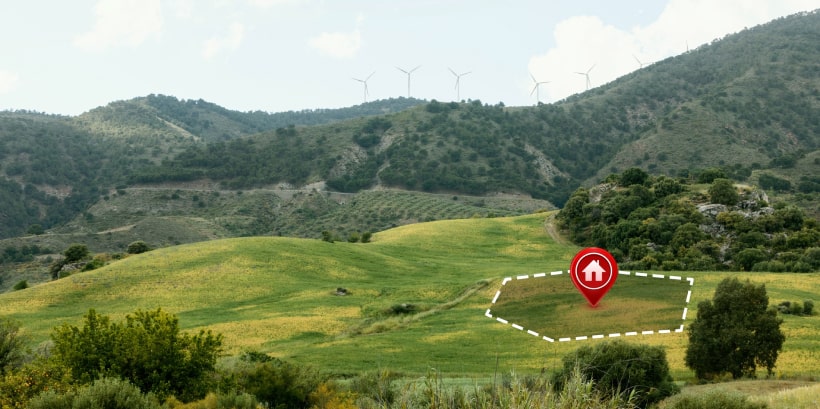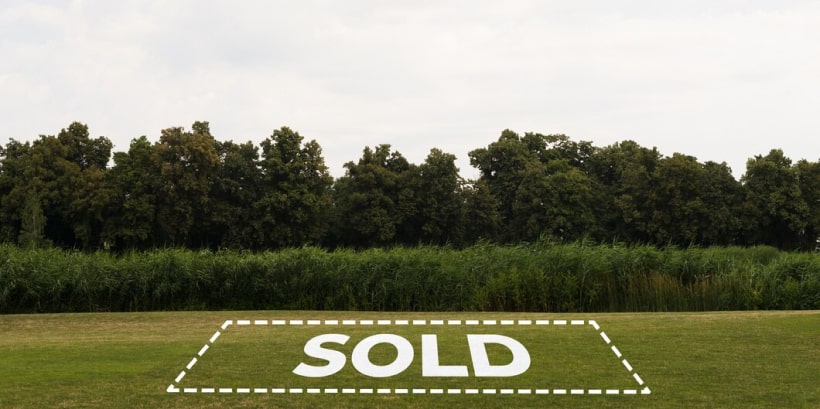Is Land an Asset or Liability? Know Before You Buy
Reading Time: 12 minutes
A common question for every new real estate investor who is planning to purchase land is whether the land is an asset or a liability.
On this note, it is important to remember that whether you are investing in agricultural land, residential or commercial land, having a clear idea of your finances is necessary. This shall help you with an idea of how much expense you can bear behind developing a particular land. For a detailed idea of whether is land an asset or a liability, read this blog till the end.
What is an Asset?
Any kind of tangible possession of a person, organization, or institution that has value and offers future security and benefit is an asset.
For instance, gold items or your savings are an asset that makes your future secure. You can invest and maintain assets in many forms like stocks, mutual funds, commodities or real estate investments like land. The type of security that you wish to hold as an asset depends on your present finances, risk appetite, and investment goals.
Furthermore, if you are looking for short-term investment returns with high risk, you can opt for stocks or mutual funds. Bonds or fixed deposits are also assets that can help you earn long-term returns at comparatively lower risk.

Types of Assets
Check out the different types of assets you can invest to earn significant ROI.

Stocks
By investing in stocks, you hold partial ownership of the company in whose shares you are investing in. The rise and fall of the share prices of the given stocks depend on the market conditions and affect your ROI. Therefore, investment in stocks is highly volatile and risky. To invest here, you must have a clear idea of how the stock market works, your goals, and your risk appetite.
Mutual Funds
In simple terms, a mutual fund is a pool of funds managed by a fund manager who handles your investment portfolio by distributing your investments to different shares. The distribution of these funds by mutual fund houses depends upon your goals and risk appetite. This is a less risky form of investment as compared to individual stock investment. Both beginners and seasoned individuals can invest in mutual funds. However, to invest here, you should have an idea of how stock market works, your risk appetite, and your objective.

Bonds
Unlike stocks and mutual funds, bonds are low-risk investments wherein you can earn fixed and a decent income until maturity. Bond investments are a great choice for persons who wish to avoid volatile returns from stock markets. Furthermore, if you are planning to invest for long-term goals like retirement, children’s education, or marriage, this can be your go-to option.
Real Estate
Very often, you might find people wondering, is land an asset? Well, let’s analyze. The value of land rises over time. Unlike the stock market, land value does not fluctuate or fall drastically. The growing demand for land leads to an increase in land value overtime. Therefore, by selling land, you can earn significantly high returns. Also, you can lease or rent real estate properties like land or houses to earn passive income. These factors make the land a low-risk asset that you can hold for a long period without worrying about major losses.

Commodities
Investment in securities like commodities includes gold, silver, oil, or agricultural products. The Commodities stocks act as an asset owing to their fluctuating market. However, owning commodities stocks in your portfolio helps you hedge your profits against when the stock market is bearish.
How does land fit as an asset?
Before investing in land for sale, several questions brush across your mind. One of the primary questions new investors tend to wonder is land an asset or liability.
If you are wondering, if is land an asset, here are a few parameters that shall act as proof for the same.
- Limited availability of land increases its demands over time, this increases value of land every year
- Landowners can earn even without selling the property. They can lease the property from time to time to earn passive income.
- Land investment offers you legal ownership of the land in terms of utilization of the property, its resources, or other development purpose.
- Investment in land acts as a hedge against inflation and secures your finances during economic stability.

Examples of Land as an asset
Let’s consider a simple example to understand whether land is an asset or a liability.
For commercial purposes, you can place the land or real estate property as collateral for secured loans. The lender will release the property after you clear their debt fully. Furthermore, with increased demand, the price of land appreciates over time.
Additionally, factors like the plot’s proximity to crucial parts of the city, development projects nearby, and ease of access act as catalysts to determine the value appreciation.
These parameters act as a driving force to categorize owning land as an asset.
What is a Liability?
To determine, whether is land an asset or a liability, it is important to understand what is a liability.
In a nutshell, liability is a financial obligation or a debt that you owe to another party. To clear off a liability, you must focus on settling or repaying the outstanding debts. This can also include, completing a contract tenure, or compensation of damages.
In the context of real estate investment, property taxes, insurance premiums, and mortgages act as a liability that you must remember to invest in land.

Types of Liabilities
To understand, is land an asset or liability better, let’s take you through the classification of liabilities.

Long-term Liabilities
Any kind of debts related to land investments that are due for more than a year become long-term liabilities. Examples of long-term liabilities are bonds payable, mortgages, and long-term leases.
Current Liabilities
As opposed to long-term debts, short-term debts that can be covered within a year are current liabilities. Short-term loans, taxes, and accounts payable are a few short-term debts that you might come across during land investment.
Factors that Makes Land a Liability
The following factors tend to turn land into a liability than an asset.

- Ongoing expensesIf the interest rate for your mortgage loan for a particular land is very high, your monthly obligations will also be high. This shall burden your finances as the expense behind a land purchase can be more than the ROI.
Furthermore, additional expenses like development costs, property, and zoning taxes also tend to transform the land into a liability rather than an asset. - Degrading DemandInstances like lack of soil fertility, higher market competition, distance from major cities, and proneness to disaster tend to lower the demand for the property. Furthermore, factors like pending legal or taxation cases can also lower the demand for the property. In such instances, the land value does not rise like its competitors or stay stagnant.

Examples of Land as a Liability
The following instances will let you know whether is a land asset or liability.
- Lands with any kind of physical or legal restriction like outstanding debts or part in legal or socio-political trial render it unusable. This makes the land a liability.
- If the land is located in a remote area with poor access to surrounding cities or important facilities, its demand will fall, and so will its price.
- If the soil quality of the land in question is bad owing to environmental contamination, it tends to grow as a liability for the owner
Strategies for Turning Land into a Valuable Asset
By now, you have a clear idea to comprehend if is land an asset or a liability. On this note, before going ahead with land investment, you must know that the demand and value of land are directly proportional. With rise in demand for your land, its value also rises.
Therefore, to turn your land into an asset from liability, consider keeping in mind the following strategies.

Research
Once you know the answer of is land an asset or liability, before investing considered conducting comprehensive research to shortlist your properties. Besides your budget and investment goal, your research must encompass the land’s ownership history, pending debts or cases, soil quality, market competition in the real estate market of the location, and nearby developments.
This shall help you with a comparative analysis of other properties and strategize an investment plan. This shall assist you in earning significant ROI by utilizing the land as an asset in the long run.

Know your Finances
To invest in land, you must have a clear idea of your financial standing. This will assist you in knowing how much loan you can opt for the purchase. On this note, you must remember, that your land purchase and loan amount should not exceed your budget so that you can repay the debts easily without burdening your finances.
In case, you are unable to secure a financial loan from mainstream lenders, you can consult with your seller for alternatives like owner financing. You can also check out your land listing platform and search for lands that offer owner financing opportunities.
Keep a Future Development Plan Ready
With a thorough knowledge of whether is land an asset or a liability, once you purchase the land, it is a crucial step to keep a future development plan ready. Consider opting for expert suggestions on ways to develop the land so that its demand in the real estate market stays at par with the competition around you. This will not let the demand and value of the property fall with time.

Generate Passive Income
Regardless, of your investment goals with the land, you can use it to generate passive income. For instance, if you have purchased underdeveloped land, you can rent the same to different organizations to set up events, or as a commercial unit. This shall help you grow your finances strategically.
Conclusion
This is everything that you must know to conclude whether is land an asset or a liability.
The fact that land is tangible, you can place it as collateral for loans and its value appreciates over time, makes land an asset. However, if its soil quality degrades, has ongoing legal or financial cases, and does not support transportation facilities, the land is a liability.
Therefore, to ensure you are investing in land as an asset, consider c
7 Reasons Why Buying Cheap Land Is Always Profitable
Reading Time: 7 minutes
It is a very commonly known notion that to reap better benefits from real estate investment, you must purchase cheap land.
Those wishing to diversify their investment portfolios with low-risk, low-cost real estate has an alluring opportunity when investing in cheap land. This is one of the many prominent reasons to buy cheap land. Besides these, other long-term benefits of this strategy are tremendous and include large tax advantages as well as high prospective profits.
If you are wondering whether it is necessary to opt for cheap land investments or not, this blog is definitely for you. This is a thorough examination of the reasons to buy cheap land can be a prudent financial move.
Table of Contents
- Reasons to Buy Cheap Land for Real Estate Investment
- 7. Less Competition
- Sum Up
- Frequently Asked Questions
Reasons to Buy Cheap Land for Real Estate Investment
The following points will take you through the 7 crucial benefits of buying cheap land in United States.
1. Affordable Purchase Price
One of the most compelling reasons to buy cheap land is the low initial cost. Unlike residential or commercial properties, which often require a large capital outlay, land can often be purchased at a more affordable price. This affordability allows investors, especially those with limited funds, to enter the real estate market more easily and even acquire multiple plots, potentially multiplying their investment opportunities.

2. Value Appreciation
Since land is a limited resource, its value will almost always rise exponentially. As the population increases, the amount of land available declines which leads to the increase in demand for underdeveloped land. Particularly in development-ready locations, the value of inexpensive land might be appreciated significantly. As these regions become more well-known and in demand, land prices rise and provide profitable returns on initial investment for strategic investors.

3. Strategic Location
This is another important benefit you must know while discussing reasons to buy cheap land.
A land parcel’s potential for appreciation is mostly dependent on its location. Over time, the value of land near developing communities, large transportation projects, or growing metropolitan regions can rise dramatically. As undeveloped areas are likely to be transformed by urban sprawl or infrastructure developments, savvy investors seek out these opportunities.
By purchasing these previously unnoticed acres at a lower price, they can sell them later to buyers and transform them into highly sought-after properties.

4. Diversification
A good way to disperse risk in your portfolio is to add land. Particularly land, real estate tends to appreciate or stay steady even in periods of market volatility for other investment kinds like bonds or stocks. Because of its stability, land can be held and sold when the time is right, making it a haven in tumultuous economic times.

5. Lower Costs to Hold Properties
Another important point to consider regarding reasons to buy cheap land is it comes with a low cost to hold properties as compared to purchasing expensive properties.
Undeveloped land only needs a little continuous upkeep, unlike properties with structures. For underdeveloped lands, there are no structures to worry about, therefore there are no maintenance, remodeling, or management fees to consider.
Moreover, undeveloped land typically has cheaper property taxes, adding to the benefits of buying land. This lessens the investor’s financial burden and makes it a wise long-term investment.

6. Tax Advantages
This is another point that you must consider as a valid reason to purchase cheap land.
Land investments may also introduce tax advantages to your finances. Many regions provide tax breaks for landowners, such as decreased property taxes, interest payment deductions, and even incentives for using the land for agricultural or conservation reasons. These benefits might make property ownership more appealing and financially feasible.

7. Less Competition
Lastly, another major point to consider is an investment in cheap land in the United States a worthy move for your finances is the presence of less competition.
The market for affordable land is often less competitive than more traditional real estate markets. Thus it becomes one of the noteworthy reasons to buy land at a lower price. Also, fewer investors equal more possibilities to identify outstanding bargains without having to make rapid decisions. Through this environment, land investors can make thoughtful consideration and due diligence, enhancing the likelihood of making a wise decision.

Sum Up
With these top seven reasons to buy land at a cheaper price, you will be ready to witness significant ROI in the long run.
To conclude, cheap land provides unique prospects for both new and seasoned investors as benefits of buying land. This includes cheap entry costs, the potential for significant value appreciation, and a variety of financial perks such as tax rebates and low maintenance costs.
Furthermore, investing in land is also a simple and effective method to diversify and build your investment portfolio. As metropolitan areas grow and land becomes scarcer, strategically acquiring affordable land today could result in significant financial rewards in the future.



